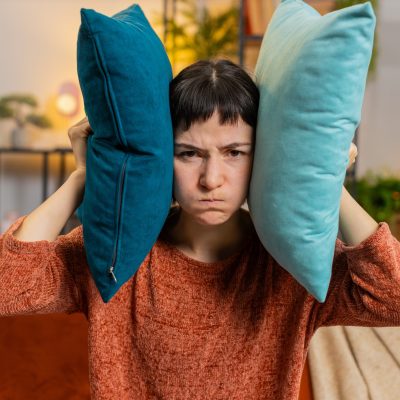Have you ever felt like your mind just can’t catch a break? Maybe you have felt overloaded with social media notifications, advertisements vying for your attention, too much noise from other people’s phones,music or laptops, loud lights in stores, or too many texts to respond to – in today’s world, the list is endless. It can feel like there is just too much happening around you: like you’re being suffocated by your surroundings.
Being overstimulated is incredibly common in this day and age, where your smartphone constantly buzzes with information, you always have someone to respond to, and you get all kinds of reminders about work that is not yet done. It can feel like your brain is crowded and you have no way of escaping the constant stimulus. Being overstimulated can make you feel irritable, frustrated with people and your surroundings, and even make you less productive than you would otherwise normally be.
Overstimulation is more common than most people realize. In fact, in our modern world, it’s practically unavoidable. That’s why knowing how to answer the question, “What does overstimulated mean?” could be the first step to helping yourself feel more in control of your life…
What Does Overstimulated Mean?
To be overstimulated means that your brain and nervous system are receiving more input than they can process. If your environment is too loud, too fast, too chaotic, or too demanding for your mental and emotional systems to handle, your body may go into a mild stress response, making you may feel anxious, irritable, drained, or even panicked.
In today’s digital and sensory-heavy culture, overstimulation has become incredibly common. You are constantly bombarded by phone calls, text messages, and social media notifications. Apps, stores, and various types of media are created to capture and hold your attention for as long as possible, occasionally causing you to feel overloaded with stimulation. It can feel like you are frequently on the verge of a meltdown from all of the mental (and literal) noise.
Feeling this way is very common. Fortunately, you can navigate sensory overload with the right tools and help. It is helpful to understand what sensory overload is, and what types of input can cause sensory overload, to be able to navigate all of the many sources of stimulation in your day to day life.
What Is Sensory Input?
The term sensory input refers to all the information your brain receives from the world around you. This includes sounds, lights, smells, textures, movement, temperature, and more. All of these things stimulate your brain.
For example, consider the experience you might have in a coffee shop. You may feel the fabric of the chair underneath you, people talking, music playing, the sound and scent of a coffee machine working, as well as the light from your phone and the buzz of another notification. Your brain is taking in and processing all of this data – that is, sensory input – to give you a proper understanding of your surroundings.
Your brain is designed to be able to process this sensory input to help orient you to your surroundings and what is happening to you. Even so, there are limits:, when you experience too much sensory input in a short period of time, or when your brain doesn’t get a reprieve from all the input, you may begin to feel overstimulated. All of the signals shooting through your brain cause you to feel irritable, panicked, like everything is “just too much” – that is overstimulation.
Types of Overstimulation
There are several kinds of overstimulation that you might experience, depending on the sensory input that is overwhelming your brain. Here are some specific categories:
Noise Overstimulation:
A crowded restaurant, traffic, loud TVs, and background music are all examples of settings that can contribute to being overstimulated by noise. Your nervous system becomes overwhelmed by sound, making it hard to think or concentrate.
Too Many Demands:
A packed to-do list, constant multitasking, and never-ending responsibilities can lead to mental burnout and emotional fatigue. Having to keep a mental list of everything you have to do can make it feel like you have to be everywhere at once, making the external stimulation around you hard for your brain to process.
Physical Touch Overload:
For some, especially those who are more sensitive to touch, constant touching, hugging, or close proximity to others can become overwhelming. If you are someone who struggles with tactile sensitivity, even the feel of certain fabrics around you can lead to overstimulation.
Chaotic Environments:
Messy homes, cluttered desks, or crowded spaces can make it feel impossible for you to focus or relax. Having all of the visual mess surrounding you can be too overwhelming for you to navigate, making you feel overstimulated.
Notification Overload:
Constantly being notified that something has been updated online, someone wants to talk to you, there is something going on nearby, etc. from your phone pulls your attention away from what you’re doing and forces your brain to reorient to a whole new train of thought. This constant shift can lead to overstimulation.
Emotional or Mental Exhaustion:
Sometimes, overstimulation comes from within. If you’re not getting enough rest, time to yourself, or moments of stillness, your brain may begin to raise the red flag of overstimulation because of overuse.
If any of this sounds like you, you are probably wondering what you can do to avoid and navigate feeling overstimulated.

How to Navigate Overstimulation
While you may not be able to control your environment completely, there are many strategies you can use to give your nervous system a chance to recharge. Here are some ways you may be able to navigate overstimulation, specific to the types of overstimulation we have discussed:
For Noise Overstimulation:
- Carry noise-canceling headphones or earplugs.
- Listen to calming music or white noise to drown out a noisy environment.
- Create quiet zones in your home where you can retreat when needed.
For Too Many Demands:
- Understand your limits of what you can and can’t do, and set healthy boundaries when things are asked of you.
- Break large tasks into small, manageable steps.
- Use time-blocking to focus on one task at a time.
For Physical Touch Overload:
- Communicate your boundaries kindly and clearly if someone wants more physical touch than you want or can handle.
- Get enough time alone and allow yourself to reset.
- Use a weighted blanket or take a hot bath to reset your nervous system.
- You may also want to consider paying attention to what clothes continuously bring your attention to what you are wearing to minimize feeling overstimulated physically.
For Chaotic Environments:
- Declutter and organize your physical space one area at a time.
- Keep one small area—like your nightstand—totally clear to protect your peace.
- Change environments to somewhere less chaotic if you are too overstimulated to try and clean up. Try to clean when you feel better so you can prevent overstimulation in the future.
For Notification Overload:
- Turn off nonessential notifications.
- Schedule “tech-free” time when you can. Don’t feel guilty for prioritizing time away from being constantly notified.
- Use the Do Not Disturb feature on your phone when focusing or resting.
For Emotional or Mental Exhaustion:
- Make sure your physical needs are met before continuing to do things that feel emotionally or mentally draining – i.e., get enough sleep, eat food if you are hungry, etc.
- Schedule alone time where you don’t have to talk or be “on.”
Journal out or talk to someone about what you are experiencing to get the weight off of you and be able to reorient what your emotional and mental needs are.

Who Is Most Affected by Overstimulation?
It can seem like some people are capable of handling a lot of sensory input, while others get overstimulated easily. Although overstimulation is very common in general, there are certain traits and conditions that make someone more likely to be overstimulated in a given situation.
People with ADHD or Autism Spectrum Disorder (ASD) often experience heightened awareness of sensory input. Because of differences in their nervous systems, they may be more sensitive to sensory input, which means that environments others find manageable can feel overwhelming to them. Bright lights, loud sounds, and interruptions can become unbearable quickly.
It is important to understand that while overstimulation may occur more frequently with someone who has ADHD or ASD, it is definitely not exclusive to them. Anyone can be overstimulated. You do not need to have ADHD or Autism to feel burned out, distracted, or mentally drained. Modern life itself – with its constant stream of information and expectations – is enough to make anyone feel overwhelmed.
Understanding the overstimulated meaning and learning how to navigate overstimulation is about recognizing your own personal limits and learning how to take care of yourself in a world that is constantly giving you more input.
You Don’t Have to Figure This Out Alone
If you find yourself frequently asking, “What does overstimulated mean?” or if you feel like, no matter what you do, you can’t find relief, you’re not alone—and you don’t have to suffer silently.
At Makin Wellness, we understand how exhausting it can be to navigate daily life when your mind and body feel like they’re on overdrive. Our specialized counselors offer online therapy in Pennsylvania, and we’d love to talk with you. Together, we can build a plan to help you feel more grounded, less anxious, and better equipped to manage your environment and emotions.
Overstimulation doesn’t have to control your life. Let us help you reclaim your peace, one online session at a time.







